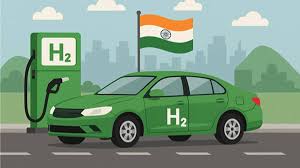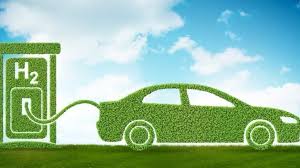New Era of Hydrogen Power in India’s Commercial Vehicle Industry – Big Step by Ashok Leyland and Tata Motors
India’s commercial vehicle (CV) industry is now slowly moving towards hydrogen-powered technology. That is, trucks and buses running on hydrogen instead of diesel or petrol are now being introduced. This new transition is being led by big automobile players – Ashok Leyland and Tata Motors. This change is happening through both hydrogen internal combustion engines (H2-ICE) and hydrogen fuel cell technology.

Hydrogen Trucks on Road by 2023
Ashok Leyland, in collaboration with Reliance Industries, launched India’s first heavy-duty truck, which runs on hydrogen internal combustion engine (H2-ICE), in 2023. Since then, more than 20 such hydrogen trucks have been operated. Together, these trucks have travelled nearly 2.5 lakh kilometres – being used extensively at Reliance’s Jamnagar site.
These trucks emit less carbon than traditional diesel trucks, and can also be cost-efficient in the long term. This is a promising solution for a country like India where pollution and oil import are both major concerns.
Fuel Cell Buses in Public Transport too
Not just trucks, Ashok Leyland has also entered the hydrogen fuel cell buses segment. The company has signed an agreement with NTPC Green Energy under which hydrogen fuel cell-powered buses are being deployed in regions with different terrains such as Delhi, Leh, and Ladakh.
These buses are also being used in high-altitude areas where supplying traditional fuels is quite challenging. This also proves that hydrogen vehicles can work effectively even in difficult environments.

Tata Motors also in Testing Phase
Tata Motors is also working quite aggressively on hydrogen-based vehicles. The company is field testing fuel cell electric buses and hydrogen combustion engine prototypes. Although their large-scale rollout has not been officially announced yet, trials are ongoing. Tata’s hydrogen-powered models are being prepared for commercial use.
Government Support and Policy Push
All these developments are happening within the framework of India’s National Green Hydrogen Mission. This mission was launched in January 2023 and its aim is to make India self-reliant in clean energy by 2030. A budget of ₹19,744 crore has been kept for this mission.
Public-private partnerships, such as collaborations of Ashok Leyland-Reliance and Ashok Leyland-NTPC, are becoming the backbone for this sector. The government’s vision is clear – transition to clean fuel, and hydrogen is emerging as a strong option in that direction.
Other OEMs are also on the radar
Apart from Ashok Leyland and Tata Motors, several Original Equipment Manufacturers (OEMs) are working on this technology. However, they are still in the initial phases of testing and research. These companies are conducting trials on parameters such as cost efficiency and operational feasibility. Some companies are trying to develop future-ready solutions through pilot projects and R&D partnerships.
Challenges still remain
Although this shift is very promising, there are still many challenges in the way of hydrogen adoption. Infrastructure – such as lack of hydrogen refueling stations, fuel supply chain not being fully ready yet, and initial vehicle cost – are all hurdles that are slowing down large-scale adoption.

But as technology improves and policy support continues, these challenges may be solved. Industry experts believe hydrogen commercial vehicles could become very popular in the next few years – especially in the long-haul trucking and public transportation sectors.
Conclusion
The journey of hydrogen power in India’s commercial vehicle industry has just begun. Presently deployment is limited – limited to a few cities and industrial zones – but initial results are encouraging. In the coming days, efforts of giants like Tata Motors and Ashok Leyland, along with strong policy support from the government, could take this segment to new heights.
Hydrogen-powered CVs can play a major role in reducing pollution, reducing oil import dependency, and promoting sustainability.
Disclaimer:
This article is written for educational purposes only. The examples given in it are not investment advice of any kind. Please do your own research and take advice from a financial advisor.
